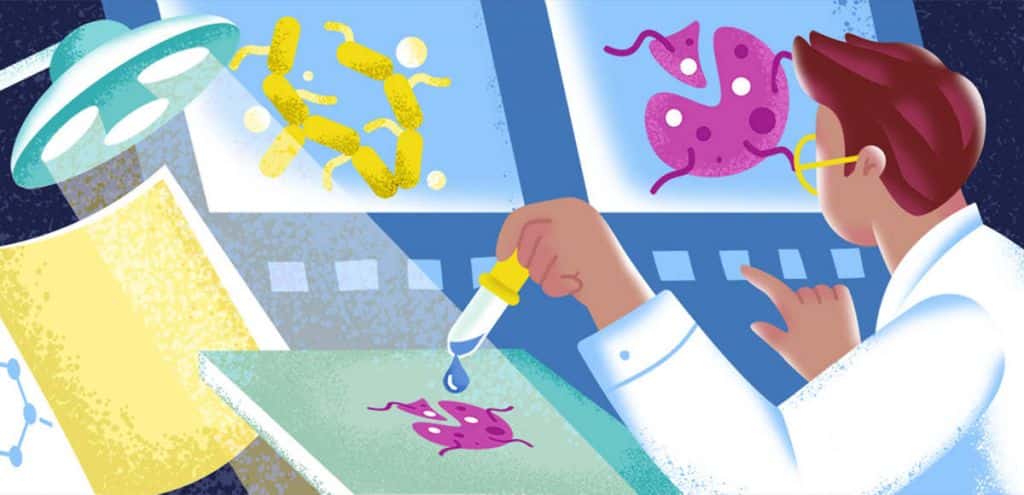Cell and gene therapies are taking off in a big way in Europe. As the buzz grows, the Swedish firm Ilya Pharma has raised €8.5M to lay down the foundations of bacterial gene therapies for enterocolitis and diabetic ulcers.
Investor interest in cell and gene therapy is ramping up fast around the world, with a record €20.1B ($23.1B) bagged last year. The industry can barely keep up with the expansion and demand for manufacturing space and capacity is growing.
“The whole cell and gene therapy field is evolving quite rapidly,” said Evelina Vågesjö, CEO of the Swedish firm Ilya Pharma.
Ilya Pharma, founded in 2016, has asserted itself in the swelling cell and gene therapy space with a recent €8.5M fundraise. The company will use the cash to bankroll the clinical development and manufacture of a gene therapy based on a type of bacteria called lactic acid bacteria. The microbes are genetically engineered to produce a protein that speeds up the healing process when the bacteria are placed on wounds.
Ilya’s lead program is due to begin a phase II trial later this year for the treatment of surgical wounds in patients with diabetes, who often have a slower healing process than normal. Other indications in the company’s sights include diabetic ulcers and enterocolitis that occurs as a side effect of checkpoint inhibitors, a type of cancer immunotherapy. To further fuel the development of the treatments, Ilya aims to go public in 2024.
One of the biggest challenges for Ilya Pharma is that its technology is seen as very niche in cell and gene therapy circles, making it harder to reach out to potential big pharma partners and investors.
“We feel that [big pharma companies] have a little bit of difficulty in where to place this project,” noted Vågesjö. “It is what it is, regardless of the need that they have to place it in a certain silo.”
One of the first players in the field of bacterial gene therapy was ActoGeniX, which was founded in Belgium in 2006. Following disappointing phase II results in ulcerative colitis, ActoGeniX was snapped up in 2015 by the US firm Intrexon (now Precigen). One of Ilya’s current competitors, the Finnish company Aurealis Therapeutics, turned heads in January 2022 when the firm inked a €126M ($139M) collaboration deal with the Chinese firm Xbiome.
“It’s good to have validation of the commercial value in the field,” Vågesjö told me. The more projects there are in the headlines, the more attention will go to bacterial gene therapies.
Another field increasing awareness of the therapeutic potential of bacteria is microbiome therapeutics. Regulatory pathways have been tough to navigate for bacterial treatments based on the microbiome, but research has moved fast. Rebiotix and Seres Therapeutics are frontrunners that could market the first-ever microbiome therapeutics later this year.
According to Vågesjö, microbiome therapeutics are not in the same regulatory class as Ilya’s therapy, but Rebiotix and Seres “were super pioneers five years ago. That’s very important for the field.”
Traditional cell and gene therapies face big challenges with manufacturing at a big scale, and many startups are working to overcome the bottlenecks. Ilya’s gene therapy is easier to manufacture than traditional gene therapies because it resembles probiotic products, which have an established production process. Ilya designed a tweaked version of the probiotics manufacturing process with more quality control than current techniques.
“Fermentation of lactic acid bacteria has been done in probiotics for a long time,” said Vågesjö. “As the bacteria are the product, I think [the manufacturing process] is easier than for recombinant proteins, adenoviral vectors, or any type of cell therapy.”
In Europe, running a clinical trial of treatments based on genetically modified organisms requires complex regulatory paperwork. Combined with the fragmented regulations in each EU member state, this burden can discourage firms from developing this technology on European soil. To better explore the potential of genetically modified organisms in healthcare in Europe, many biotech companies have called for a more streamlined regulatory approach.
“We need some form of collaboration on how to view genetically modified organisms for pharmaceutical development,” concluded Vågesjö. “It doesn’t have to be connected to agriculture, for instance, just because it was historically.”
Cover image via Anastasiia Slynko





